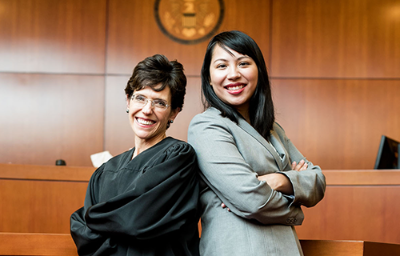Information that applies to all types of field placements is located on the main Field Placements page.

Judicial field placements involve working in the chambers of a state or federal judge in exchange for unit credit at Loyola. Externs perform tasks such as file evaluation, legal research, or preparation of memoranda.
Look through our Judicial Referral Contact List available on 12twenty’s Resource Library for a comprehensive list of judges we have worked with in the past and their application requirements. This list is not meant to be exhaustive. Current field placement openings/postings can also be found on 12twenty under OCI and Job Listings.
Watch: "Perspectives on Judicial Externships" on YouTube. Judges Owens and Birotte participate along with former externs who went on to clerk and practice.
Additional Resources for 1Ls
The Resource Library on 12twenty contains a comprehensive collection of essential materials tailored for first-year students, offering guidance on various topics such as Summer Judicial Field Placements and other opportunities.
1L Summer Field Placement Judicial Application Tracking Form
How do I start looking for a judicial field placement?
Start early! Use this chart for reference:
|
For the fall semester |
Apply in March of the spring semester |
|
For the spring semester |
Apply during the first week of classes in August or earlier! |
|
For the summer session |
Upper division students should apply in October of the fall semester.
|
The process starts with this 5-step procedure:
-
- Review the Field Placements website and Judicial Field Placements page for comprehensive information. Look through our Judicial Contact List, available in 12twenty’s Resource Library, for a comprehensive list of judges we have worked with in the past and their application requirements.
- Have your resume in top shape and approved and on file with the Career Development Office. Contact the Field Placement Faculty Director if you have questions about different judges, time commitments and different courts that might be appropriate for you. Have a draft of your cover letter ready.
1Ls who wish to apply for the summer should send their cover letter and resume to Professor Grace Parrish (grace.parrish@lls.edu) for approval by the deadlines indicated on the “1L Summer Judicial Externships - Application Materials & Timeline” document, which can be found on 12twenty (Resource Library > Field Placements - Judicial Externships). - Send out your applications to the judges you have selected. An application consists of a cover letter, your resume, a brief sample of written legal work, and often a copy of your transcript. Your application should be sent as a formal hard copy unless the judge accepts email applications. Your cover letter will request an interview. Samples of cover letters are available on the Career Development Office website.
- If you get an interview (see the 12twenty Resource Library for interview tips), please assume that the clerks or judges will “Google” you in advance of the interview just as you will try to “Google” them. Make sure any social networking sites reflect the professional side of you and not any “wild party” side of you. Time to take those pictures down. You are a professional now.
- If you get an offer and accept it, fill out an application online by creating a “New Experience” within 12twenty’s Experiential Learning tab.
- Review the Field Placements website and Judicial Field Placements page for comprehensive information. Look through our Judicial Contact List, available in 12twenty’s Resource Library, for a comprehensive list of judges we have worked with in the past and their application requirements.
What is the difference between state and federal court?
In general, federal courts require a greater time commitment; most prefer full-time externs, although bankruptcy and magistrate courts will accept part-time externs. Federal courts are courts of more limited jurisdiction, and contact is often more frequent with post-graduate clerks than with the judge. In general, state courts are courts of broader jurisdiction and offer more daily and direct contact with the judge. Most downtown Los Angeles state courts arrange parking for externs, while federal courts do not.
What courts are available and what time commitments are required?
During the academic year, the state superior courts and appellate courts will accept part-time externs (2-3 days per week) and full-time externs. The United States 9th Circuit Court of Appeals will only accept full-time externs. Most federal Central District courts require full-time externs, but some will accept part-time (3 days per week) externs. Federal bankruptcy courts and federal magistrate courts will accept part-time externs (2-3 days per week) and full-time externs. During the summer session, most judges prefer full-time students for 8-10 weeks. Some state court judges will accept part-time summer session externs.
During the summer session, all units must be paid for independently of academic year tuition. If you cannot afford to pay for units, you are welcome to volunteer during the summer.
What if I am offered a position before my other interviews are completed?
Think seriously about where you would like to have a field placement before submitting an application. Apply only to those chambers, entities, and organizations where you would accept if given an offer.
If you are given an offer, be prepared to accept it and politely cancel the remainder of your scheduled interviews. Never accept a position and then later decline it so that you can accept a different position. Try to schedule your interviews in the order of your preference. Your tact and professionalism in these matters are critical to your reputation.
What happens after I accept an offer?
Congratulations. Follow up the acceptance with a letter to chambers thanking them and letting them know when you will begin. You should graciously decline further interviews with a telephone call immediately.
Next, apply through 12twenty. More information on how to apply for field placement units can be found here.
Only the Field Placement Department can enroll you in field placement units administered by the Department. Please make sure you have room in your schedule for the placement units.